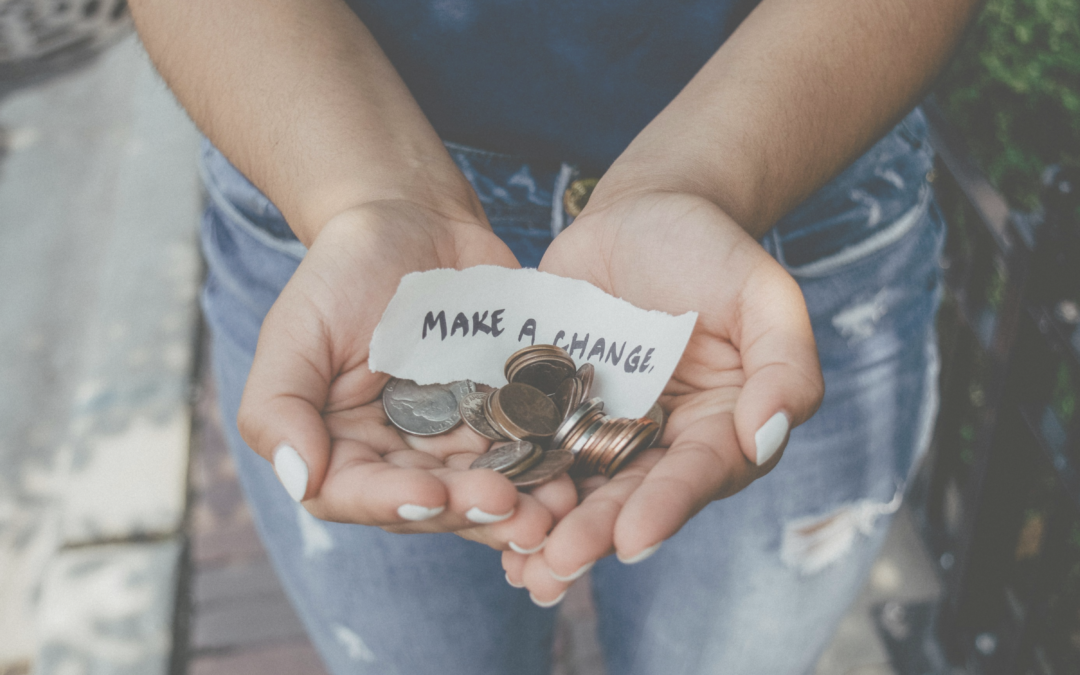Is financial freedom one of your intentions for this year? Let’s talk about it!
Mindful spending is a practice rooted in awareness and intentionality when it comes to managing finances to create financial freedom. It involves being conscious of where your money goes and making intentional choices aligned with your values and long-term goals.
Being an active participant in how you spend money and your financial choices.
Money doesn’t have to be a scary, taboo topic. It can be empowering, exciting and provide you the financial freedom you’ve been craving.
Our finances have a huge impact on our mental health and wellbeing. Your financial well-being is just as important. The mindset you bring into managing your finances and how your money comes and goes is important and something you should be in control of.
Being aware of how money is flowing to you and where it goes fosters a deeper connection to your financial goals and values, making your dreams of financial freedom more real and attainable.

Practical Advice for Mindful Budgeting to Create Financial Freedom:
1. Assess Your Financial Situation:
- Take stock of your current financial status, including income, expenses, and savings. Keep track each month going forward, so you’re always in the loop.
- Organize your financial documents and create a clear picture of your financial landscape.
2. Identify Needs vs. Wants:
- Start to take stock of your current financial reality. What are your essential expenses and what is more for fun?
- Struggling to figure out what’s essential and what’s for fun? Check out Maslow’s Hierarchy of needs and start at the bottom. Your needs don’t just involve the basic essentials of life, like food, water and shelter. There are other things, that may not feel essential but contribute strongly to your life. Get real and get honest during this process.
3. Create a Realistic Budget:
- Create yourself a personalized budget that reflects income, expenses and savings goals.
- It’s important to keep things flexible and adjust the budget as circumstances change. Make this budget work for you. Sure, there are lots of sources you can go to to learn more about creating a budget, but I think it’s important to have one that is tailored to you.
- It’s not just about having a budget where you get rid of everything fun in your life. Don’t discount your joy. When you create a mindful and intentional budget, it will automatically decrease your impulsive spending, while acknowledging the things that bring you true happiness.
4. Track Spending Habits:
- Tracking your expenses will help you identify patterns in your spending and areas where you can make improvements. It’s important to do this objectively. Don’t bring shame or guilt into it. Spend as you normally would, and track everything. I recommend doing this for a month and getting a good overview of your current habits. Be kind and be truthful.

Making Intentional Financial Decisions:
Now, let’s chat about how to make those mindful and intentional decisions with your money. Getting yourself set up is important, and you need the objective practices, but there is so much more to wealth management and creating financial freedom than just dealing with the money.
-
Practice Delayed Gratification:
- Delayed gratification is where instead of getting rewarded or getting that dopamine hit immediately, you delay it for another time. This is extremely helpful when it comes to money management and mindful spending. It’s a little like paying yourself later. Resisting the urge to spend something now, on an item you want in the moment, knowing that savings will pay off in the long run.
- Once you consciously do this a few times, the practice becomes easier. You begin to really think about your purchases and what you truly want. You buy things less impulsively, so the things you do end up buying are things you a) truly want and b) serve a bigger purpose.
- Some tips for getting started with intentional spending are:
- If there’s something you want, take a photo or store it in your mind, and wait. You can keep coming back to it or simply wait a few days, and if after some separation you decide it’s something you still want, then go for it.
- Think about your values, mission and goals/intention. When you feel the urge to buy something, simply ask yourself “Does this item match my long-term goals/values?” If it does, spend some time thinking about it and researching if it’s the right one for you. If it doesn’t, move along.
- A similar strategy is to think about your ideal self. The self you have to be in order to be a person with financial freedom. Once you have this person in your mind, act as if you are that person already. Make decisions like you’re already your ideal self. When you see something you want to buy follow a similar process to the point above and ask yourself “Does this item match my ideal self? Is it something my future, financially free self, would have/need/want?” And then proceed as above.
-
Set Financial Goals:
- Set your goals. Make sure they’re specific and that they align with your ideal self, the self that has financial freedom in the future. Using this self as your guide for this process will keep you in the realm of mindfulness and intentionality.
- It’s always good to know what you want your future to look like. Ask yourself, what do you truly want to accomplish, what do you want to spend your money on, what is important to you in regards to money?
- When you align your spending with your long-term financial objectives, intentional spending becomes much easier. When you have a crystal clear vision of your future, goals that inspire, motivate and excite you and the discipline to stay focused on those goals, you end up spending less impulsively and more mindfully. You end up with a house with only items that truly bring you joy, and set yourself up for success in the future.
-
Prioritize Investments in Yourself:
- Investing isn’t just about investing in stocks and other avenues. Investing in yourself is also a highly valuable form of investment. Investing in your education, personal development and experience sets you up for future success and financial freedom. Improving your own skills helps future-proof you in your business, in your job, and allows you to be able to withstand the unexpected.
- Investing in yourself can lead to long-term financial growth and fulfillment. Statistics show that those who are educated and who continue to work on improving their own skill set, are more successful in the future. They make more money, they’re more likely to be able to move up the career ranks and they’re able to think creatively to come up with financial solutions that lead to financial freedom in the future.
- I am not just talking about a college or university degree. There are many ways to invest in your future and in your education.
-
Practice Gratitude and Contentment:
- Gratitude plays a huge role in cultivating contentment and reducing the desire for excessive consumption. This can dramatically improve your intentionality and mindfulness around money and the way you spend it. Gratitude also works on a mindset and law of attraction level. When we show gratitude for all of the money we receive, as well as, everything we spend money on, money is more likely to flow back to us.
- For instance, when you have to pay your phone bill, saying a small gratitude such as, “I’m so grateful to be able to pay my phone bill and have a way to stay connected to my loved ones” is a powerful way to keep a clear perspective around having to spend that money.
- Here are some practices for incorporating gratitude into daily life to foster a positive mindset and create a life of financial freedom:
- Keep a gratitude journal and either start or finish your day by writing out things you were grateful for during your day.
- Saying thank you each time you receive a payment and each time you pay for something.
- Set aside time at the start of your workday to meditate and think about things you’re grateful for in that moment.
- Show gratitude for things that you want, that you don’t have yet. Future-cast your gratitude so the universe knows you are ready to receive.
Here’s a breakdown of the concept of mindful spending and how it can lead to financial freedom and abundance:
1. Awareness and Consciousness:
Mindful spending begins with an awareness of your financial habits, including your income, expenses and saving patterns. By paying attention to where your money goes, you gain insight into your spending behaviours and can identify areas where adjustments may be needed.
2. Alignment with Values:
Mindful spending involves aligning your spending choices with your values and priorities. Instead of mindlessly consuming or following societal trends, you make decisions that reflect what truly matters to you. This could mean prioritizing experiences over material possessions, investing in personal development or supporting causes that are meaningful to you.
3. Intentional Decision-Making:
With mindful spending, each financial decision is made deliberately and with purpose. You consider the long-term impact of your choices and how they align with your financial goals. This may involve weighing the trade-offs between immediate gratification and long-term financial security.
4. Reduced Financial Stress:
Practicing mindful spending can help reduce financial stress and anxiety by fostering a sense of control and empowerment over your finances. When you’re mindful of your spending habits and make intentional choices, you’re less likely to overspend or accumulate debt, leading to greater peace of mind.
5. Financial Freedom and Abundance:
By adopting a mindset of mindful spending, you pave the way for financial freedom and abundance. You become more conscious of opportunities to save and invest, allowing your money to work for you and grow over time. As you prioritize your financial goals and make intentional decisions with your money, you create a solid foundation for achieving greater financial stability and abundance in the long run.
Overall, mindful spending is about cultivating a deeper awareness of your relationship with money and making choices that support your financial well-being and overall happiness. By practicing mindful money management, you can create a path toward financial freedom, abundance and a more fulfilling life.
XO,
Sarah
P.S. If you want to learn more about manifesting and reaching your goals of financial freedom, check out this free training.
Each week, Meagan hosts a live training in the Facebook group. To get a bigger picture of how to manifest the life of your dreams and reach your goals head over to the group!
